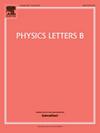有暗物质的德西特时空中的强宇宙审查
IF 4.3
2区 物理与天体物理
Q1 ASTRONOMY & ASTROPHYSICS
引用次数: 0
摘要
在对暗物质施加弱能量条件后,我们发现即使在没有电荷的情况下,一个具有完美流体暗物质的球对称德西特黑洞仍然可能具有考奇地平线。本文研究了这种黑洞的考奇地平线在无质量标量场扰动下的稳定性。通过对无质量标量场准正态模式的数值计算,我们发现在这种时空中,当黑洞接近极值时,即暗物质参数b接近其最大值bmax时,可能会违反强宇宙审查(SCC)猜想。这是首次在球对称不带电黑洞中观测到经典的 SCC 违反现象。此外,我们还探索了参数空间ΛM2-b/bmax内的SCC违反区域。我们的研究结果表明,随着宇宙学常数的增加,违反区域最初会扩大,然后收缩。本文章由计算机程序翻译,如有差异,请以英文原文为准。
Strong cosmic censorship in de Sitter spacetimes with dark matter
After imposing the weak energy condition on dark matter, we find that even in the absence of charge, a spherically symmetric de Sitter black hole with perfect fluid dark matter may still possess a Cauchy horizon. This paper investigates the stability of the Cauchy horizon in such a black hole under perturbations from a massless scalar field. Through numerical calculations of the massless scalar field's quasinormal modes, we discover that in this spacetime, when the black hole approaches extremality, i.e., when the dark-matter parameter b approaches its maximum value , the Strong Cosmic Censorship (SCC) conjecture may be violated. This is the first instance of classical SCC violation observed in a spherically symmetric, uncharged black hole. Additionally, we explore the region of SCC violation within the parameter space . Our findings indicate that as the cosmological constant increases, the violation region initially expands and then contracts.
求助全文
通过发布文献求助,成功后即可免费获取论文全文。
去求助
来源期刊

Physics Letters B
物理-物理:综合
CiteScore
9.10
自引率
6.80%
发文量
647
审稿时长
3 months
期刊介绍:
Physics Letters B ensures the rapid publication of important new results in particle physics, nuclear physics and cosmology. Specialized editors are responsible for contributions in experimental nuclear physics, theoretical nuclear physics, experimental high-energy physics, theoretical high-energy physics, and astrophysics.
 求助内容:
求助内容: 应助结果提醒方式:
应助结果提醒方式:


